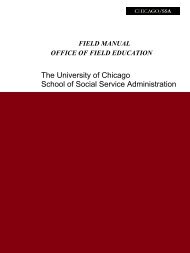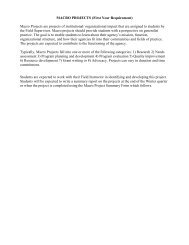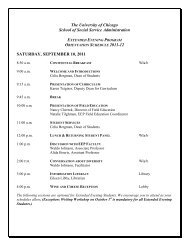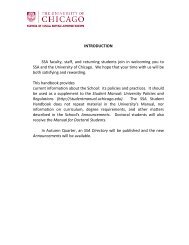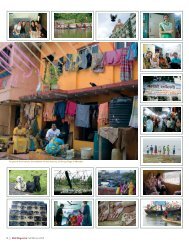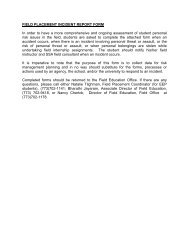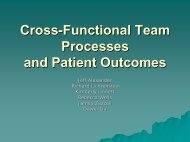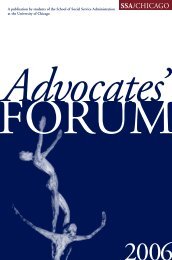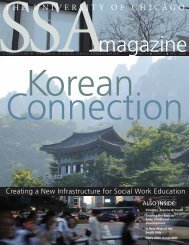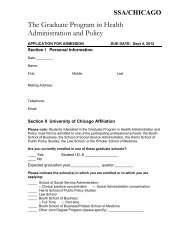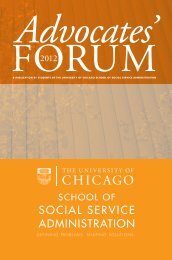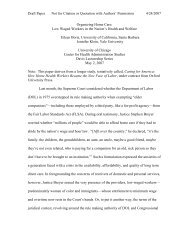2004 - School of Social Service Administration - University of Chicago
2004 - School of Social Service Administration - University of Chicago
2004 - School of Social Service Administration - University of Chicago
Create successful ePaper yourself
Turn your PDF publications into a flip-book with our unique Google optimized e-Paper software.
UNDOCUMENTED IMMIGRANTS<br />
because they are in a position to immediately benefit and succeed.<br />
Furthermore, these students cannot be ignored by society in the hope that they<br />
will leave the country or simply be absorbed by sectors <strong>of</strong> the economy that<br />
typically employ undocumented workers. Providing undocumented students<br />
with opportunities to realize their full potential benefits society socially and<br />
financially.<br />
OPPOSITION TO LEGISLATIVE CHANGES<br />
Some oppose any legislative changes easing policies towards undocumented<br />
students, asserting that granting undocumented students the right to attend<br />
college, obtain financial aid, and apply for citizenship sends the wrong message<br />
to immigrants and society as whole (An education in citizenship, 2003).<br />
Furthermore, opponents speak <strong>of</strong> undocumented immigrants as criminals, and<br />
contend that such changes would unfairly reward those who reside illegally in<br />
this country (Byrne, 2003). They allege that these students are no more entitled<br />
to amnesty than any <strong>of</strong> the other groups <strong>of</strong> undocumented immigrants<br />
who reside in the U.S. Opponents also argue that changing the laws would<br />
encourage more illegal immigration to the United States (Jervis, 2003a;<br />
Graham, 2002). In fact, the debate has grown very heated, with some opponents<br />
taking a drastic stance. For example, when the Denver Post reported the<br />
story <strong>of</strong> Jesus Apodaca, an undocumented student hoping to attend college,<br />
Congressman Tom Tancredo from Colorado began a campaign to have<br />
Apodaca and his family deported (Graham, 2002).<br />
Some assert that federal legislation supporting undocumented students<br />
would take substantial federal money and financial aid away from deserving<br />
U.S. citizens (Jervis, 2003a). Others criticize the means by which advocates for<br />
undocumented students formulate their arguments, contending that those in<br />
favor <strong>of</strong> loosening restrictions for undocumented students base their positions<br />
entirely on subjective, emotional arguments, rather than realistic, objective,<br />
practical assertions (Wycliff, 2002). Personal experiences, such as those <strong>of</strong><br />
Taina Unzueta and Miguel Parra (Puente, 2001), are very effective in conveying<br />
the human side <strong>of</strong> the issues, and there are thousands more stories like<br />
those <strong>of</strong> Taina and Miguel. While the personal stories <strong>of</strong> undocumented students<br />
may be powerful in mobilizing support for policy changes, this work has<br />
also sought to articulate the clear, tangible, objective benefits to enacting federal<br />
legislation that allows undocumented students to attend college, receive<br />
financial aid, and obtain citizenship. Furthermore, while federal policy changes<br />
would clearly reward deserving students, they also make practical sense on a<br />
national level.<br />
13



